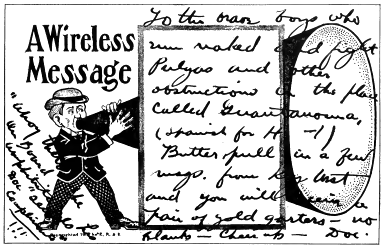
The Drama and Struggle of Strenuous Radio Times in the Jungle--Hitherto Unpublished Memoirs of High Technical and Human Interest--What Really Happened in the Early Days of Wireless Telegraphy
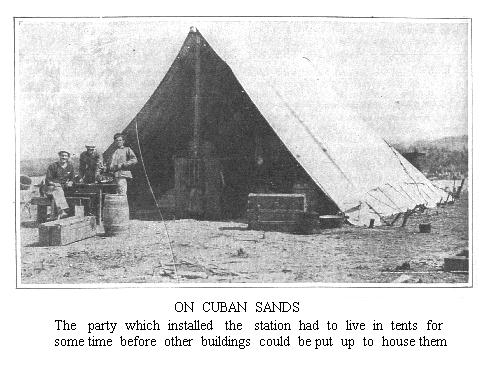
 |
| "DOC" DE FOREST TO MR. BUTLER-- |
| The postal card was mailed in St. Louis on June 14, 1905. He writes: "To the brave boys who run naked and fight pulgas and other obstructions in the place called Guantanamo (Spanish for h---l) Better pull in a few msgs. [messages] from Key West and you will receive a pair of gold garters --no blanks--cheer up--Doc." And along the side: "'Ahoy there on board the Amphitrite--Doc sends his compliments'" The pulgas are small insects, almost invisible. They swarmed about the station in clouds, and their bite, while not poisonous, was very annoying. Since these insects chose to hover under clothing, the radio pioneers at Guantanamo often took the easiest way and removed most of theirs, hence Dr. De Forest's remark about the "boys who run naked" |
 ONE of my first thrills happened on this pathfinder trip. As we emerged from the jungle trail onto a wide level stretch of sand flats, I noticed that far ahead of us the earth looked bluish white, while beneath us it was hard packed salty sand. Nearing the blue patch I noticed this "land" moving. Slowly the bluish white part was separating in the middle with a wide swath and making a path showing the earth underneath. My companion, noticing my amazement, smiled and told me that this was a large army of land crabs scampering away to avoid us. They were there by the millions--ugly, worthless, destructive creatures with glaring, protruding eyes and wicked claws, some of them as big as human hands. In their cowardly nature they scurried and scampered away from us. But had we fallen helpless by the wayside they would immediately have returned to devour us.
ONE of my first thrills happened on this pathfinder trip. As we emerged from the jungle trail onto a wide level stretch of sand flats, I noticed that far ahead of us the earth looked bluish white, while beneath us it was hard packed salty sand. Nearing the blue patch I noticed this "land" moving. Slowly the bluish white part was separating in the middle with a wide swath and making a path showing the earth underneath. My companion, noticing my amazement, smiled and told me that this was a large army of land crabs scampering away to avoid us. They were there by the millions--ugly, worthless, destructive creatures with glaring, protruding eyes and wicked claws, some of them as big as human hands. In their cowardly nature they scurried and scampered away from us. But had we fallen helpless by the wayside they would immediately have returned to devour us.
 |
 |
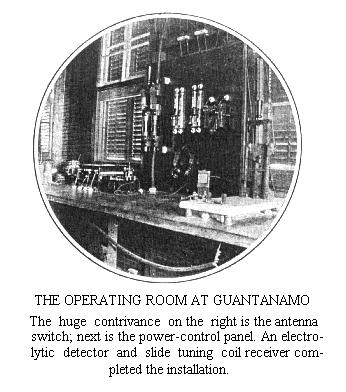 FOR some reason, unknown to me, a so-called government inspector was sent there for the purpose of watching me and my work. I will not mention his name here, but Marianna called him "Mistah Sinka-Walla" and that name stuck with him till he left after I did. He stayed on the job religiously for eleven long months, every day, Sunday included, from 8 A. M. till 5 P. M. He watched me constantly and said nothing. Never a word of encouragement or suggestion, but whenever anything went wrong he was always there with his familiar, "I thought so."
FOR some reason, unknown to me, a so-called government inspector was sent there for the purpose of watching me and my work. I will not mention his name here, but Marianna called him "Mistah Sinka-Walla" and that name stuck with him till he left after I did. He stayed on the job religiously for eleven long months, every day, Sunday included, from 8 A. M. till 5 P. M. He watched me constantly and said nothing. Never a word of encouragement or suggestion, but whenever anything went wrong he was always there with his familiar, "I thought so."
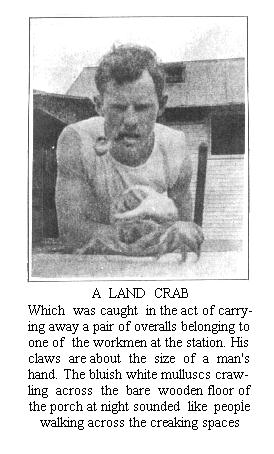
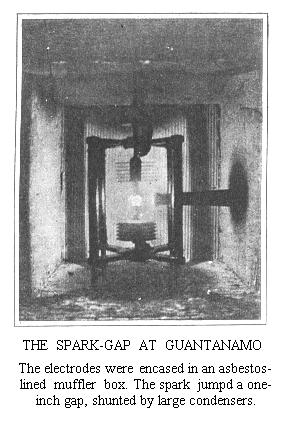
July 28th, 1905: Your very interesting letter concerning the lightning storm received. It was very graphic account of a frightful experience. Appreciate your devotion to the cause in taking the risk you did and am glad so little damage to our apparatus occurred.Then, in reviewing my diary of that year, the following few terse sentences graphically portray the unbroken schedule of daily mishaps we encountered:
August 9th, 1905: You certainly are the star martyr to the wireless cause at present and have our fullest sympathies--if those will do you any appreciable good. None of us are too happy or enjoying flowery beds of ease. It is a tough problem and I can't tell what "ist los," but will keep trying new stunts until it is solved. "Never say die," and "You can't stop a Yank," are the two cardinal mottoes of the wireless bunch, you know.
October 4th, 1905: I am enclosing plan for connecting up the six condensers. The tinfoil has been shipped from the lab. You can put this on with paraffin, as we generally do now, building up the whole thing under oil. (Imagine working for days with arms immersed in kerosene.)
November 8th, 1905: Glad to get your long letter of 30th, and regret it is so full of hard luck tales. Sincerely hope your big transformer (weighing a ton) won't blow up again and believe that the new ground plate will remedy your troubles. You show splendid grit as you always do in facing these difficulties.
November 20th, 1905: Your yellow feverish, earth quakish letter came to hand this morning. I am sorry your troubles are holding up so well, but do not get discouraged as we have ours here, and you have not succeeded in cornering the trouble market by any means.
December 26, 1905. I want to thank you most heartily for the very kind letter of Christmas greetings you wrote me. There is no one in our employ who has shown himself more loyal and determined in his efforts to hasten success of the system than yourself, and you may be sure that I appreciate it fully.
June 5th, 1905: Big 50 H. P. motor generator blew up, damaging armature.I had almost begun to think I was waging a hopeless battle against nature as week after week a fresh burst of some new and unforeseen trouble presented itself.
June 7th. Commenced taking off tin roof on building and substituting it with asbestos.
June 12th. Commenced repairing damaged trays in condensers.
June 14th. Lined condenser trays with portland cement.
June 26th. Killed an 8-foot Moha snake in back yard. This was the cause of so many of our chickens disappearing.
July 10th. Constructed plate glass condensers for motor and circuit breakers.
July 13th. Terrific storm 2:30 A. M. Lightning struck station bursting an entire room full of condensers--just finished after two weeks of hard work--throwing oil and plate glass all over the room and into the walls.
July 14th. Repaired damaged antenna wires.
July 26th. Changed all d. c. wiring throughout station 36 inches away from a. c. from engine house to station.
August 14th. Rained this evening during exceedingly bright moon which caused unusual phenomena of two bright rainbows at night.
August 21st. Small cyclone struck us.
August 31st. Lightning struck the station at 4:15 P. M. blowing up one set of condensers.
September 5th. No fresh water. Had to drink salt water all day.
Sept. 24th. Another entire span of 15,000 feet antenna wire blew down.
Sept. 27th. Touched off station again and blower motor blew up.
October 8th. Herd of horses from workmen's camp broke corral in night and demolished the guy wires on the entire aerial spans twisting wires badly.
October 15th. Earthquake at 4:43 P. M. while eating supper.
October 17th. Finished new ground to-day.
October 19th. Rewound blower armature.
November 7th. Secretary of Navy Taft visited us to-day.
November 17th. Heard Key West and Pensacola first time.
December 10th. Key West heard us first time. Blew up blower motor.
December 15th. Big two-ton transformer blew up.
 |
| ONE OF DR. DE FOREST'S CABLEGRAMS |
| To Mr. Butler and his associates in Cuba. It was filed in Pensacola, Florida on August 3, 1905 and reads: "Butler Naval Wireless Station Guantanamo listen five thirty to eleven thirty A. M. no night work check coming Lee De Forest". Many messages of this sort had to be exchanged before the new Naval station in Cuba could be put in order. |
London, E. C.All the desperate trials of the Cuban experience seemed wiped out by this letter. For were they not worth it, those trials, when one was working for Dr. Lee De Forest?
April 20th, 1906
Mr. Frank E. Butler,
New York City.
MY DEAR FRANK:
Upon the occasion of the final acceptance by the U. S. Navy of the five large stations, of which you have been in charge, I wish to extend to you on behalf of myself and of the American De Forest Wireless Telegraph Co., congratulations, hearty and sincere, and to felicitate you upon your safe return to God's country.
Too often it is the case that while the faults and blunders of men receive prompt and severe criticism, the merits of their work, the fidelity of their services pass unacknowledged, even if fully appreciated by their employers. I trust that this may never be the policy of our company.
All of the officials of this corporation have watched with intense pride the heroic efforts you have made, the great patience through long months of discouragement and difficulties which have necessarily preceded this success. I can deeply appreciate the nature of your labors, your trials, the hardships you have undergone, for it has been my good fortune to have been with you at your post and shared in, while directing your work.
This work, these experiments, these long-drawn-out tests, carried on in the face of unforeseen and manifold difficulties have, I believe, not only achieved the wireless success intended, but have been the means of developing character, a determination to bear and achieve like good soldiers; have ripened a friendship and a loyalty to one another and to a worthy cause, which constitutes in life elements of even greater value than commercial success.
We do not, we cannot forget the obstacles you have had to face and which you have bravely overcome.
For tedious months away from home and friends, in climates scorching and unhealthy, deprived of all usual comforts of life, tormented night and day by insect pests, distressed but not baffled by static unknown to any other wireless workers, delayed month after month by breakdowns of Navy apparatus, continually called upon to make repairs, often without proper tools, facing skeptical criticism, surrounded by hostility, open or concealed on the part of officials from whom we had every reason to expect cooperation and interest,--yet, you have stuck to your posts, have triumphed over one difficulty after another, have forced new secrets from Nature, and having by your tenacity, patience and skill accomplished your ends, you have won at last acknowledgment of the success of the system from the entire Navy Department, and set a new standard in the art of Wireless Telegraphy.
In view of your services in this unexampled undertaking we wish to express, although in inadequate words, some portion of praise you so well deserve, and to express our confidence that this navy work is but the beginning of greater things we are yet to accomplish together in wireless.
Very sincerely yours,
LEE De FOREST.
Vice Pres. and Scientific Director.